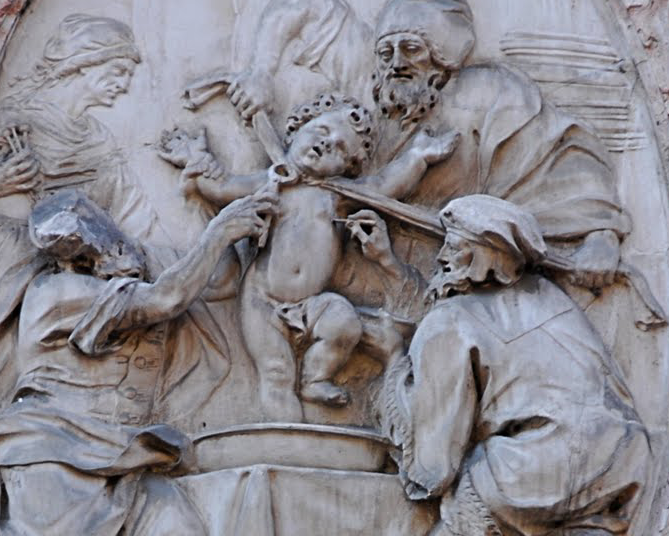The Prisoner in the Temple: the Bloodiest Lie January 13, 2015
Author: Beach Combing | in : Ancient , trackbackBeach has previously looked at ‘the gong of the world’, the desert boy Apion, who while still brushing sand from his hair, decided to insult the Jews of Alexandria and, indeed, the Jews of the entire Mediterranean. We do not have Apion’s anti-semitic work, the classical equivalent of the Protocols of the Elders of Zion: it did not survive. But we do have Josephus’s reply. This is one of the most curious passages from Josephus’ work. Apion had accused the Jews of stealing Greeks for human sacrifice and this ‘fact’ emerged when Antiochus Epiphanes went into the Jewish temple to despoil it. He finds there a man stretched out on a bed with wonderful foods placed before him. The man begs Antiochus to release him and Antichus asks what is wrong.
The man made a lamentable complaint, and with sighs, and tears in his eyes, gave him this account of the distress he was in; and said that he was a Greek and that as he went over this province, in order to get his living, he was seized upon by foreigners, on a sudden, and brought to this temple, and shut up therein, and was seen by nobody, but was fattened by these curious provisions thus set before him; and that truly at the first such unexpected advantages seemed to him a matter of great joy; that after a while, they brought a suspicion to him, and at length astonishment, what their meaning should be; that at last he inquired of the servants that came to him and was by them informed that it was in order to the fulfilling of a law of the Jews, which they must not tell him, that he was thus fed; and that they did the same at a set time every year: that they used to catch a Greek foreigner, and fatten him up every year, and then lead him to a certain wood, and kill him, and sacrifice with their accustomed solemnities, and taste of his entrails, and take an oath upon this sacrificing a Greek, that they would ever be at enmity with the Greeks; and that then they threw the remaining parts of the miserable wretch into a certain pit.
The man claimed he only had a short few days left and begged Antiochus to free him.
Josephus is understandably furious about this slander and spends several sentences on refuting it in high-flown Greek, which there is no need to repeat here. However, this is a moment of history. Here we have the first recorded example of the blood libel, the claim that Jews steal gentiles to sacrifice them or to use them for magic, a lie that cost the lives of thousands of Jews in antiquity and the middle ages and even in more modern times. It would be interesting to know whether Apion was repeating a folk legend here, or whether he had just dreamt this up for himself. Howard Jacobson in a short note in The Classical Quarterly (2001) notes a parallel with Euripides’ Iphigenia among the Taurians, where a temple-priestess captures and imprisons Greek strangers to sacrifice them and wonders whether Apion had not just taken the story from there. Given Apion’s poor reputation for truth it is quite possible. If so it was possibly the most bloody borrowing in history.



